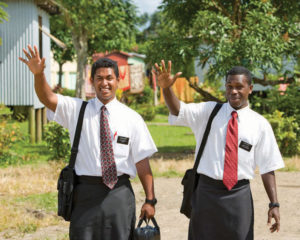Missionaries know that very little teaching is needed once a person has read the Book of Mormon with an open heart. So little added instruction is needed because the Spirit will bear witness of the truth of the book all on it’s own. Because of this, missionaries strongly encourage investigators to read the Book of Mormon. When the missionaries teaching me invited me to read, I at first had only a passing interest in the reading assignment but most of the time I didn’t read it at all.
 Even after I had come to feel quite enamored of the things the missionaries were teaching me, and had begun to read the Book of Mormon from the beginning on my own, I still didn’t feel anything for or in the scriptures. One hundred and sixty eight pages into the Book of Mormon, I read the story of Abinadi. That singular story changed my life and changed my attitude toward the scriptures forever.
Even after I had come to feel quite enamored of the things the missionaries were teaching me, and had begun to read the Book of Mormon from the beginning on my own, I still didn’t feel anything for or in the scriptures. One hundred and sixty eight pages into the Book of Mormon, I read the story of Abinadi. That singular story changed my life and changed my attitude toward the scriptures forever.
In Mosiah, chapters 11, 12 and 13, I read about how Abinadi’s sure knowledge in the goodness of his God overwhelmed any fear he might have had in the face of the formidable King Noah. Abinadi was not to be swayed from the mission he had been given: To teach the gospel to the Lamanites and preach repentance unto all who would hear. Abinadi lost his life for his cause, but not before touching the heart of one man, Alma, who went on to influence generations with Abinadi’s message.
For some reason, the story of Abinadi touched me like no other scripture ever had before. ‘Touched me’ doesn’t even describe it: His story broadsided me, struck the breath out of me and knocked some serious sense into my muddled mind and confused heart. I encourage you to read it yourself, if you have not already done so. Start your reading in Mosiah 11:20; I pray you’ll be inspired, as I was.
From that moment on, I read the scriptures every possible moment. I devoured them. Like Enos, a Book of Mormon prophet, “my soul hungered” for the word of God and I couldn’t read enough. I read the Book of Mormon over seven times that year alone.
Still, to this day, I have a great and abiding love for the scriptures and can truly testify that they are the word of God and He speaks to us through them. I love all the scriptures, but particularly the Book of Mormon because they were written specifically for us today; and they are a boon to my life daily.
The thing about scripture reading, though, is that it must be undertaken with full presence of heart and mind. You can’t casually read scripture and expect to benefit from them; if you do that, you’re only reading words and words alone can’t uplift you. To truly benefit from the scriptures, you must delve into them, absorb them, drink them up.
Elder Merrill J. Bateman said “… in order to come unto Christ and be perfected in him, each person needs to receive a testimony of the Lord’s words. Some individuals falter because they fail to open the books, others because they read casually. As one would expect, there is a difference between diligent searching or “pondering over the scriptures” and casual reading.” (“Coming unto Christ by Searching the Scriptures,” Ensign, Nov 1992,27)
This is so true, I had to share it. I have joy in reading the scriptures because they are like a meal to me, they truly feed my soul and enrich my life. However, I have personally experienced the difference when I have only read casually compared with when I have feasted upon them. In fact, even though I know that searching the scriptures is a verb and requires effort on my part and even though I know that I am greatly improved when I do that, I still often fall into the habit of casually reading so as to ‘get in’ my daily allotment of scripture-reading.
Lehi had a dream in which “[he] saw a tree which produced a fruit which was exceedingly white, very sweet to the taste, and desirable above all other fruit. He saw a path leading to the tree and a rod of iron along the path. He saw mists of darkness on the path, which caused some to lose their way and wander off. Others reached the tree by holding to the rod, but then became ashamed, let go of the rod of iron, and fell away. According to the vision, the only way to reach the tree and become a permanent partaker of the fruit was to “continually [hold] fast” to the iron rod. (1 Ne. 8:30)
What was the rod of iron? Nephi defined it as the “word of God”—the words of the living prophets and the scriptures, which point people to Christ. Nephi further stated that those who hearkened and held fast to the word of God would never perish. (See 1 Nephi 15:24)”
The tree in the dream is the tree of life, which represents God’s love for us as expressed in the condescension of the Father and the Son. (See 1 Ne. 11.) Holding fast to the iron rod builds faith in Christ and his work. (Merrill J. Bateman, “Coming unto Christ by Searching the Scriptures,” Ensign, Nov 1992, 27)
It took me a while to come to realize the true value of the scriptures and the wonderful nourishment they offered me. Now that I know that this feast lays prepared for me every day of my life, what joy I have! The scriptures are the iron rod that will lead us to eternal happiness and joy. Along the way, they offer our souls the nourishment and strength needed to make this perilous journey called life.
I know the scriptures, particularly the Book of Mormon, are the word of God and that they were given to us to feed our souls and nurture our minds so that we might find joy in our journey. I hope you will join and that together we may “feast upon the words of Christ.” (2 Ne 32:3)


